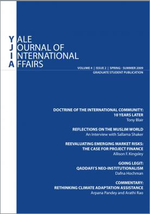Getting unstuck from the boring rut of aid debates
This aid debate is starting to sound rehearsed. People really need to move on to different questions, and stop running the same conferences and forums.
 This is the very sensible opinion of Chris Blattman on an aid discussion just published in the Yale Journal of International Affairs, which included yours truly and other better people. I am bored as anyone else with endlessly repeating the same arguments, and would dearly love to move on.
This is the very sensible opinion of Chris Blattman on an aid discussion just published in the Yale Journal of International Affairs, which included yours truly and other better people. I am bored as anyone else with endlessly repeating the same arguments, and would dearly love to move on.
Hope flared briefly with yesterday’s story: Aid agencies announce they will be accountable to independent evaluators. As soon as this happens, I would be very happy to close Aid Watch and move on to other things.
By all means, let’s all try to find new arguments, new tactics of persuasion, new satires, new promises to not do satire, anything that will work to get out of this rut.
But when the actions you criticize continue unchanged, you have to keep criticizing those same actions. And when the people you are debating keep making the same arguments, you have to keep repeating the counter-arguments.
Professor Collier, in your contribution to YJIA, you do offer hope to spice up the discussion. In response to the question about “the risks …[of] military intervention as an acceptable development policy tool,” you say:
We need clearer international rules of engagement. By defining the circumstances in which international intervention is legitimate, we also define those in which it is not.
Maybe we could move the debate to a more exciting level if you would clarify who is included in “We”?
You also add a very welcome dose of realism:
Everybody is happy to propose the aid architecture appropriate for the best-case scenario, but there has been political reluctance to think through the architecture appropriate at the other end of the spectrum.
I totally agree with you, now we are getting somewhere!
Oops, now I am a little bit puzzled by this recommendation:
I would like to see an explicit process of mutual commitments covering the post-conflict decade made by the Security Council (for the provision of security), the aid agencies …and the post-conflict government …I would like to see the Special Representative of the Secretary General of the United Nations given greater powers of coordination over other actors during this decade, in effect as the neutral supervisor of these mutual commitments.
So, all the Great Powers on the UN Security Council will give up all their foreign policy interests and agree to universal and benevolent neutrality, and everyone else in the world will now recognize them as neutral and benevolent? Wouldn’t this qualify as a “best-case scenario”? Perhaps if this scenario doesn’t work out then it's time to accept your suggestion to "think through the architecture appropriate at the other end of the spectrum”?
(I hope these last two blog posts don't violate my satire probation!)
 From Aid to Equality
From Aid to Equality
